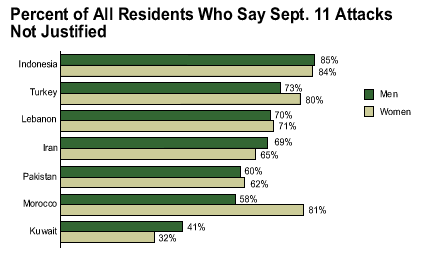In the wake of the Sept. 11 terrorist attacks, many commentators suggested that the attacks arose from the anger that Muslims in general, but young Islamic men in particular, harbor toward the United States. But a Gallup poll of seven* predominantly Islamic countries finds that young men in those countries are not more likely than older men, nor more likely than women in general, to find justification for the Sept. 11 attacks. The poll also finds that on another issue -- U.S. military action in Afghanistan -- there are also few differences between men and women, or among the age groups. The major conclusion: Regardless of gender or age, large majorities of residents in each country say the United States is not justified in fighting in Afghanistan.
Attacks on the United States Justified?
The major findings in the seven countries polled about the Sept. 11 attacks in the United States are as follows:
- Six of the seven countries show large majorities of people who say the attacks on the United States were not justified.
- The only exception is Kuwait, where opinion on the matter is about evenly divided between those who say the attacks were justified and those who say they were not.
- The poll also shows that there are few differences among the age groups on this matter, with only Kuwait showing that young people are more likely than older people to say the attacks were justified.
- However, contrary to expectations, younger women in Kuwait are slightly more likely than younger men to say the attacks were justified.
- Also, contrary to expectations, there is not a large gender gap in these countries over the justification for the attacks on the United States. Only in Morocco are women much more likely than men to say the attacks were not justified. In the other six countries, the gender gap is relatively small.
The extent of the gender gap is shown in the accompanying chart, which includes percentages of men and women who say the Sept. 11 attacks were not justified. Eighty-one percent (81%) of females in Morocco take that point of view, compared with 49% of males -- a difference of 32 percentage points. The next largest gender gap is found in Kuwait, but it is a reverse gap, in which men are nine percentage points more likely to say the attacks are unjustified than are women (41% to 32%). Turkey shows a gender gap of seven percentage points in the expected direction, with 80% of women opposed to the attacks compared with 73% of men. All the other differences between men and women are within a few percentage points.

Among men and women under the age of 30, Morocco continues to show a major gender gap in the expected direction, with young women 30 percentage points more likely to say the attacks were not justified than men (89% vs. 59% respectively). The gender gap in Turkey is slightly larger among the youth than among all residents, with 81% of young women and 68% of young men opposing the attacks. Kuwait and Iran show reverse gender gaps of seven and six points, respectively.
U.S. Military Action in Afghanistan
Among all of the countries polled on this question, large majorities of residents say that U.S. military action in Afghanistan is not justified. The lowest percentage expressing this view is about six out of 10 residents in Turkey, and the highest percentage is nine in 10 residents in Indonesia. The results also show few differences by age or gender.
*The Gallup poll actually included nine predominantly Islamic countries, but Saudi Arabia and Jordan would not allow the questions about the attacks in the United States and U.S. action in Afghanistan to be included in the questionnaires used in their countries.